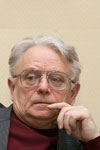
National Research University “Higher School of Economics” (HSE)
Moscow, Russia
-
Propositions toward the development of a psychological theory of thought
-
Thought is considered a psychological concept associated with an individual’s mental ex- istence. It is apparent that a great deal of research has been focused on thought as an area of study. however, there is no psychological theory of thought which provides an expla- nation for its nature and structural organization. So far, researchers have mainly looked at the ways this concept is expressed, rather than investigating what it actually is. In this study, however, based on studies of the functions of the psyche, mental processes, and the neurophysiological bases of mental activity, thought is identified as a need-emotion- intentional substance existing in the human being’s inner world. In keeping with this understanding of thought, the hypothesis that thought generation is caused by desire and experience (feeling and emotion) is put forward. An individual’s thought is linked to his behavior or motivation for activity, and is followed by an emotional experience. The process of thought generation is regarded through the mechanism of behavioral motiva- tion. The primary purpose of this mechanism is to define the qualities of the external objects that serve for need satisfaction and functionality in individuals. The ability to generate thoughts is a feature of thinking related to an individual’s mental ability or frame of mind. From this standpoint, a person’s mentality is considered to be the capacity of the individual to generate thoughts and work through thoughts. It is shown that the abil- ity to generate thoughts and establish relationships within a stream of consciousness is characteristic of human intelligence. Some basic propositions toward a development of a psychological theory of thought are introduced.
DOI: 10.11621/pir.2017.0115
Keywords: mental processes, function of the psyche, substantial thought, thinking onto- logy, thought
-
-
The role of reflection and reflexivity in the development of students’ abilities
-
This article analyzes different approaches to defining reflection and reflexivity. The mastery of intellectual operations reveals the role of reflexivity in the development of abilities. The operational aspect of reflection is emphasized in the article. The study is premised on the expectation that the effective realization of intellectual activities and the development of abilities determined by these activities are conditioned by adequate reflection on conscious acts directed toward the performance of educational-cognitive tasks. The data from the experiment show that reflexivity as a personality trait is highly developed in students with high indexes of general intellectual operations. The research findings indicate the role of reflexive mechanisms in students’ acquisition of intellectual abilities. The implications of these findings are discussed.
DOI: 10.11621/pir.2013.0205
Keywords: activity subject, ability, reflection, reflectivity, development, intellectual operations
-
-
Students’ Development in the Learning Process
-
A system genetics approach has been employed to study students’ mental development. Ability development is considered in terms of mastering of intellectual operations. The study endeavors to identify the components of certain abilities consciously acquired by a student in the process of learning. The study was arranged in two directions: the teaching of students to master intellectual operations and use them in their work with training materials, and psychological testing of control and experimental student groups before and after training tests to diagnose the level of intellectual development. The study involved teachers and students of primary and secondary school.
DOI: 10.11621/pir.2012.0024
Keywords: ability, intellectual operations, mental development, training activities, subject of activity, system genetics approach
-
-
Testing of Mental Abilities
-
This article reports on the results of development of human mental abilities measurement method based on the stated theoretical positions. Such positions are represented by the following: the thesis formulated by M.I. Sechenov that a thought is generated in the process of establishing a connection between the object and its properties; the definition of thin king given by S.L.Rubinstein who wrote that in the process of solving a problem the object manifests its new properties and qualities, it shows a new side, a new content is "bailed out" of it, as well as the thesis about mental development of abilities formulated by V.D. Shadrikov (2007).
DOI: 10.11621/pir.2010.0010
Keywords: abilities, mental abilities, abilities testing, intelligence test, psychometric procedure, validity, reliability
-









